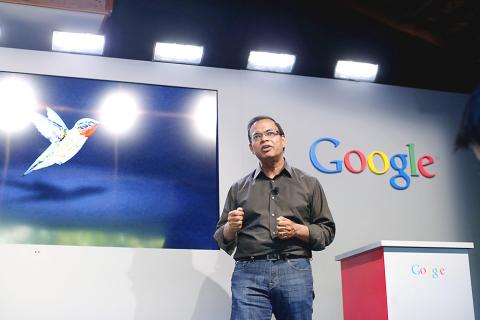Google Inc has overhauled its search algorithm, the foundation of the Internet’s dominant search engine, to better cope with the longer, more complex queries it has been getting from Web users.
Amit Singhal, senior vice president of search, told reporters on Thursday that the company launched its latest “Hummingbird” algorithm about a month ago and that it currently affects 90 percent of worldwide searches via Google.
Google is trying to keep pace with the evolution of Internet usage. As search queries get more complicated, traditional Boolean or keyword-based systems begin deteriorating because of the need to match concepts and meanings, in addition to words.

Photo: Reuters
“Hummingbird” is the company’s effort to match the meaning of queries with that of documents on the Internet, Singhal said from the Menlo Park garage where Google founders Larry Page and Sergey Brin conceived their now-ubiquitous search engine.
“Remember what it was like to search in 1998? You’d sit down and boot up your bulky computer, dial up on your squawky modem, type in some keywords, and get 10 blue links to Web sites that had those words,” Singhal wrote in a separate blogpost.
“The world has changed so much since then: Billions of people have come online, the Web has grown exponentially, and now you can ask any question on the powerful little device in your pocket,” he wrote.
Google celebrated its 15th birthday on Thursday with a trip down memory lane and an update to the search engine formula which helped spawn the tech giant.
The company took journalists on a tour of where it all started — Susan Wojcicki’s garage in Menlo Park, California, where Larry Page and Sergey Brin began working on Google in 1998. Wojcicki is currently a Google vice president.
A Google+ page included a photo album of the original home search page and collected dozens of birthday wishes.

Hon Hai Precision Industry Co (鴻海精密) yesterday said that its research institute has launched its first advanced artificial intelligence (AI) large language model (LLM) using traditional Chinese, with technology assistance from Nvidia Corp. Hon Hai, also known as Foxconn Technology Group (富士康科技集團), said the LLM, FoxBrain, is expected to improve its data analysis capabilities for smart manufacturing, and electric vehicle and smart city development. An LLM is a type of AI trained on vast amounts of text data and uses deep learning techniques, particularly neural networks, to process and generate language. They are essential for building and improving AI-powered servers. Nvidia provided assistance

GREAT SUCCESS: Republican Senator Todd Young expressed surprise at Trump’s comments and said he expects the administration to keep the program running US lawmakers who helped secure billions of dollars in subsidies for domestic semiconductor manufacturing rejected US President Donald Trump’s call to revoke the 2022 CHIPS and Science Act, signaling that any repeal effort in the US Congress would fall short. US Senate Minority Leader Chuck Schumer, who negotiated the law, on Wednesday said that Trump’s demand would fail, while a top Republican proponent, US Senator Todd Young, expressed surprise at the president’s comments and said he expects the administration to keep the program running. The CHIPS Act is “essential for America leading the world in tech, leading the world in AI [artificial

DOMESTIC SUPPLY: The probe comes as Donald Trump has called for the repeal of the US$52.7 billion CHIPS and Science Act, which the US Congress passed in 2022 The Office of the US Trade Representative is to hold a hearing tomorrow into older Chinese-made “legacy” semiconductors that could heap more US tariffs on chips from China that power everyday goods from cars to washing machines to telecoms equipment. The probe, which began during former US president Joe Biden’s tenure in December last year, aims to protect US and other semiconductor producers from China’s massive state-driven buildup of domestic chip supply. A 50 percent US tariff on Chinese semiconductors began on Jan. 1. Legacy chips use older manufacturing processes introduced more than a decade ago and are often far simpler than

Gasoline and diesel prices this week are to decrease NT$0.5 and NT$1 per liter respectively as international crude prices continued to fall last week, CPC Corp, Taiwan (CPC, 台灣中油) and Formosa Petrochemical Corp (台塑石化) said yesterday. Effective today, gasoline prices at CPC and Formosa stations are to decrease to NT$29.2, NT$30.7 and NT$32.7 per liter for 92, 95 and 98-octane unleaded gasoline respectively, while premium diesel is to cost NT$27.9 per liter at CPC stations and NT$27.7 at Formosa pumps, the companies said in separate statements. Global crude oil prices dropped last week after the eight OPEC+ members said they would